 The Comfort of Ghosts (Maisie Dobbs, #18) by Jacqueline Winspear
The Comfort of Ghosts (Maisie Dobbs, #18) by Jacqueline Winspear Format: eARC
Source: supplied by publisher via Edelweiss
Formats available: hardcover, paperback, ebook, audiobook
Genres: historical fiction, historical mystery, World War II
Series: Maisie Dobbs #18
Pages: 361
Published by Soho Crime on June 4, 2024
Purchasing Info: Author's Website, Publisher's Website, Amazon, Barnes & Noble, Kobo, Bookshop.org, Better World Books
Goodreads
A milestone in historical mystery fiction as Maisie Dobbs takes her final bow!
Psychologist and investigator Maisie Dobbs unravels a profound mystery from her past in a war-torn nation grappling with its future.
London, 1945: Four adolescent orphans with a dark wartime history are squatting in a vacant Belgravia mansion—the owners having fled London under heavy Luftwaffe bombing. Soon after a demobilized British soldier, ill and reeling from his experiences overseas, takes shelter with the group, Maisie Dobbs visits the mansion on behalf of the owners.
Maisie is deeply puzzled by the children's reticence. Their stories are evasive and, more mysteriously, they appear to possess self-defense skills one might expect of trained adults in wartime. Her quest to bring comfort and the promise of a future to the youngsters and to the ailing soldier brings to light a decades-old mystery concerning Maisie’s first husband, James Compton, who was killed while piloting an experimental aircraft. As Maisie picks apart the threads of her dead husband’s life, she is forced to examine her own painful past and question beliefs she has always accepted as true.
The award-winning Maisie Dobbs series has garnered hundreds of thousands of followers around the world, readers who are drawn to a woman who is of her time, yet familiar in ours—and who inspires with her resilience and capacity for endurance at the worst of times. This final assignment of her own choosing not only opens a new future for Maisie Dobbs and her family, but serves as a fascinating portrayal of the challenges facing the people of Britain at the close of the Second World War.
Over seventeen previous books in the Maisie Dobbs series, hundreds of thousands of readers worldwide have fallen in love with this fearless, compassionate woman—this final adventure not only ties up all Maisie’s loose ends, but also serves as a fascinating portrayal of life in Great Britain after the close of the second World War.
My Review:
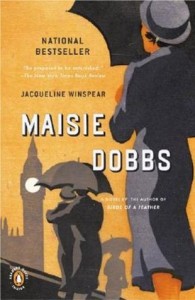 As seems fitting for this final book in the Maisie Dobbs series, A Comfort of Ghosts begins with an ending. One of the towering – literally as he was quite tall – secondary figures in this long-running series, Lord Julian Compton, originally Maisie’s employer, once-upon-a-time her father-in-law, later and last her friend, has died, Leaving Maisie to mourn, to comfort his widow, to be the executor of his estate and to clean up his last act in the late war.
As seems fitting for this final book in the Maisie Dobbs series, A Comfort of Ghosts begins with an ending. One of the towering – literally as he was quite tall – secondary figures in this long-running series, Lord Julian Compton, originally Maisie’s employer, once-upon-a-time her father-in-law, later and last her friend, has died, Leaving Maisie to mourn, to comfort his widow, to be the executor of his estate and to clean up his last act in the late war.
Sending a group of young squatters to her empty house in London, to protect some of Britain’s most hidden and secretive wartime operatives from a false charge of murder. They are a loose end, and entirely too many ‘boffins’ in the war offices have become so accustomed to death being the only tool in their toolbox to take care of such loose ends that they are willing to send four adolescents to the hangman for a crime that wasn’t really a crime that they had the misfortune to witness.
This final story of Maisie’s adventures shows her doing what she has always done best – discovering a problem and getting to the bottom of a situation that someone doesn’t want to be found while protecting as many innocents – and even some of the guilty – along the way.
That, in the middle of this investigation she has the opportunity to finally lay to rest the ghosts of her own past as well as bring her dearest friend back from the brink of disaster and help not one but two dear and deeply scarred veterans out of their very own pits of despair while searching for yet one more complicated truth hidden behind a scrim of convenient lies makes The Comfort of Ghosts, and the solace that Maisie has finally learned to take from her own, a perfect ending to the series.
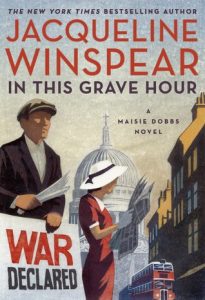 Escape Rating A-: This story closes all the circles that were opened back in the very first book in this series, the titular Maisie Dobbs, finds all the dangling threads that have been left hanging through the course of EIGHTEEN BOOKS, and ties each and every one of them off. So it’s a book about endings.
Escape Rating A-: This story closes all the circles that were opened back in the very first book in this series, the titular Maisie Dobbs, finds all the dangling threads that have been left hanging through the course of EIGHTEEN BOOKS, and ties each and every one of them off. So it’s a book about endings.
At the same time, because of its setting, it’s also a book about beginnings. The series began in the years just before the opening of the ‘Great War’, when young Maisie became an under-housemaid in the household of Lord Compton at the age of thirteen. Maisie’s midnight raids of the great house’s great library were discovered by the mistress of the house, Lady Rowan Compton, and Maisie’s life took a different direction than it otherwise might, leading to all of the marvelous if sometimes fraught adventures and heartbreaks of the series.
But this story takes place in 1945. The second World War has just ended, the recovery and reconstruction has barely begun. Britain is no longer the seat of empire, and the U.S. – and Russia – have taken center stage as a new thing – superpowers.
Maisie and her generation of friends and frenemies are middle aged or older, retiring, returning to home and hearth, or lying dead on a battlefield from one war or the other. This last story, this reckoning of all her accounts, is her swansong.
Which is a hint and a half not to start the series here. It’s not necessary to real all of the previous 17 books to get into this one – I have a few I never got around to but probably will eventually – but this story has so much more resonance if you’ve read at least some and have gotten to know Maisie’s circle of friends and colleagues and contacts and the myriad ways that their lives have become interconnected over the decades.
 For those, like this reader, who have gotten to know Maisie over the years and books, this story is a bittersweet delight. It also feels right that Maisie leave the stage at this historical juncture, as the world she knew is not the world that is to come – as we know and as hints are shown in the story.
For those, like this reader, who have gotten to know Maisie over the years and books, this story is a bittersweet delight. It also feels right that Maisie leave the stage at this historical juncture, as the world she knew is not the world that is to come – as we know and as hints are shown in the story.
But, in that desire to get every thread tied off with a neat bow and foreshadow the changes in the world as it will be, it may have lingered just a bit too long and found a way to tie that last bow just a bit too coincidentally. Your reading mileage may vary.
Still and absolutely all, a marvelous and utterly fitting ending to a captivating series, leaving this reader with both that smile because it happened and a tear or two because it ended.

 Fatal Enquiry (Barker & Llewelyn, #6) by
Fatal Enquiry (Barker & Llewelyn, #6) by 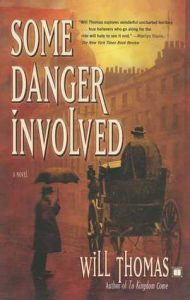 Most of the entries in the
Most of the entries in the  What makes the story rise to an A+, at least for this reader, was the delicious irony of the ending. Nightwine returns to London with deep, well-laid plans to eliminate Barker. Barker, forced to react rather than plan, still manages to maneuver Nightwine to what he believes will be his enemy’s downfall. It’s only after the results of that inevitable confrontation have been dealt with that Barker learns that both he and Nightwine have both been played by someone neither realized was even studying their board – let alone running it.
What makes the story rise to an A+, at least for this reader, was the delicious irony of the ending. Nightwine returns to London with deep, well-laid plans to eliminate Barker. Barker, forced to react rather than plan, still manages to maneuver Nightwine to what he believes will be his enemy’s downfall. It’s only after the results of that inevitable confrontation have been dealt with that Barker learns that both he and Nightwine have both been played by someone neither realized was even studying their board – let alone running it. Every Time We Say Goodbye (Jane Austen Society, #3) by
Every Time We Say Goodbye (Jane Austen Society, #3) by  I picked this up because I loved the author’s earlier book,
I picked this up because I loved the author’s earlier book,  Escape Rating B: Before I get to the story of the book, I absolutely need to say something about the audiobook. Specifically, that the audiobook is excellent. The reader, Juliet Aubrey, was a perfect choice and she made the whole thing better and carried me through even at points where I wondered how the parts of the story connected to each other because she was just awesome.
Escape Rating B: Before I get to the story of the book, I absolutely need to say something about the audiobook. Specifically, that the audiobook is excellent. The reader, Juliet Aubrey, was a perfect choice and she made the whole thing better and carried me through even at points where I wondered how the parts of the story connected to each other because she was just awesome. .
.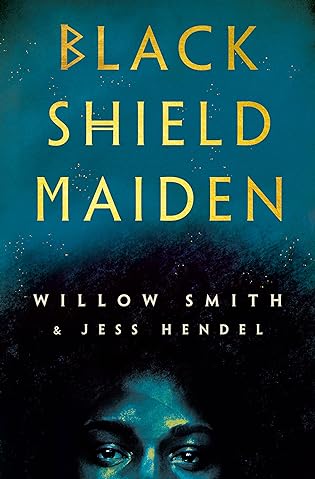 Black Shield Maiden by
Black Shield Maiden by  Escape Rating A-: I came to this book by an odd route. I watched a playthrough of
Escape Rating A-: I came to this book by an odd route. I watched a playthrough of  The Murder of Mr. Ma (Dee & Lao, #1) by
The Murder of Mr. Ma (Dee & Lao, #1) by 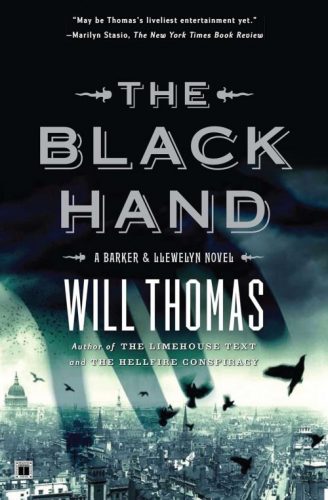 The Black Hand (Barker & Llewelyn, #5) by
The Black Hand (Barker & Llewelyn, #5) by 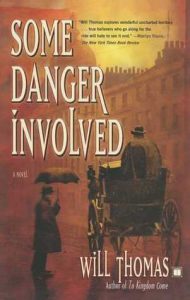 So far, at least, the
So far, at least, the 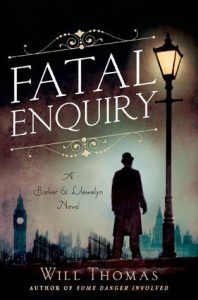 Last but not least there’s the resonance to the now in this story that is very much steeped in the ‘then’. Because while the case may be about the Mafia, what’s behind their advent into London is a debate about immigration and immigrants and just how easy or difficult it should be and just how much enforcement is necessary and which way and upon whom the economic impacts have and will fall.
Last but not least there’s the resonance to the now in this story that is very much steeped in the ‘then’. Because while the case may be about the Mafia, what’s behind their advent into London is a debate about immigration and immigrants and just how easy or difficult it should be and just how much enforcement is necessary and which way and upon whom the economic impacts have and will fall. Because I’ve enjoyed this series so much so far, it was an obvious choice for one of this week’s Blogo-Birthday giveaways – especially as the latest book in the series,
Because I’ve enjoyed this series so much so far, it was an obvious choice for one of this week’s Blogo-Birthday giveaways – especially as the latest book in the series, 
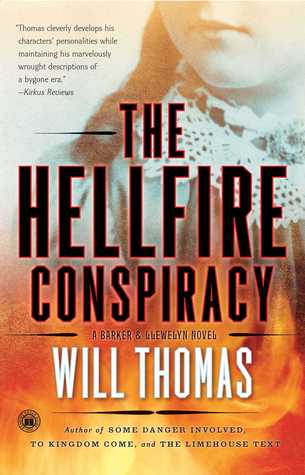 The Hellfire Conspiracy (Barker & Llewelyn, #4) by
The Hellfire Conspiracy (Barker & Llewelyn, #4) by 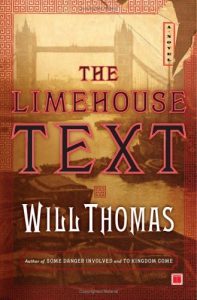 This fourth entry in the marvelously absorbing
This fourth entry in the marvelously absorbing 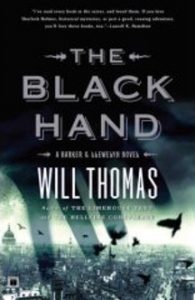 But it’s the characters of Cyrus Barker and Thomas Llewelyn themselves that keep the reader turning pages. Especially in a case like this one, where they go in knowing that the odds of a happy ending are very much against them, but determined to bring as much justice as can be had to all the victims of this atrocity; the living and the dead.
But it’s the characters of Cyrus Barker and Thomas Llewelyn themselves that keep the reader turning pages. Especially in a case like this one, where they go in knowing that the odds of a happy ending are very much against them, but determined to bring as much justice as can be had to all the victims of this atrocity; the living and the dead. The Graveyard of the Hesperides (Flavia Albia Mystery, #4) by
The Graveyard of the Hesperides (Flavia Albia Mystery, #4) by  No matter how much technology advances, human nature remains pretty much the same, and that’s a big part of what makes historical mysteries so much fun AND so absorbing. That’s especially true in the
No matter how much technology advances, human nature remains pretty much the same, and that’s a big part of what makes historical mysteries so much fun AND so absorbing. That’s especially true in the  In other words, I came into this book with a whole lot of nostalgia and more than a bit of mystery reading background and baggage crowding my thoughts and falling out a bit willy-nilly all over the place. After all, it’s been nearly two years since I last visited Flavia Albia and her family in
In other words, I came into this book with a whole lot of nostalgia and more than a bit of mystery reading background and baggage crowding my thoughts and falling out a bit willy-nilly all over the place. After all, it’s been nearly two years since I last visited Flavia Albia and her family in  Even as she is in the midst of her own wedding and the hope of future happiness that it brings. If she can just manage to solve this case and get her in-laws out of her own and her formidable mother’s hair before someone’s face gets shoved into fist. Quite possibly her father’s.
Even as she is in the midst of her own wedding and the hope of future happiness that it brings. If she can just manage to solve this case and get her in-laws out of her own and her formidable mother’s hair before someone’s face gets shoved into fist. Quite possibly her father’s. Murder at the Merton Library (Wrexford & Sloane, #7) by
Murder at the Merton Library (Wrexford & Sloane, #7) by  No matter how much, or how sincerely, they promised each other that they wanted a bit of peace and quiet with no murder investigations at the end of the previous book in the series,
No matter how much, or how sincerely, they promised each other that they wanted a bit of peace and quiet with no murder investigations at the end of the previous book in the series, 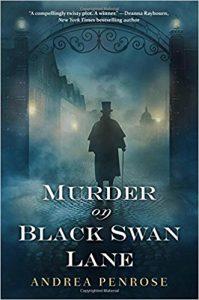 Escape Rating A-: I discovered this series last summer – another time when I was hunting for a good mystery series – and it has been an absolute delight every single time I’ve picked the series back up. But I held onto this entry because I’ve learned that no matter how great a series is – and this absolutely is – it just isn’t a good idea to read the series books too closely together no matter how much I’m tempted.
Escape Rating A-: I discovered this series last summer – another time when I was hunting for a good mystery series – and it has been an absolute delight every single time I’ve picked the series back up. But I held onto this entry because I’ve learned that no matter how great a series is – and this absolutely is – it just isn’t a good idea to read the series books too closely together no matter how much I’m tempted.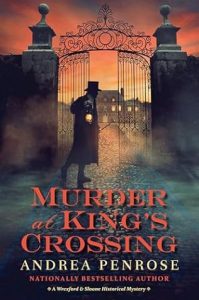 And on my third hand, one of the people caught up in this farrago clearly wasn’t onboard with all the deviltry involved, and could have had made much different choices, and we are confused by and feel for that character almost as much as Charlotte does.
And on my third hand, one of the people caught up in this farrago clearly wasn’t onboard with all the deviltry involved, and could have had made much different choices, and we are confused by and feel for that character almost as much as Charlotte does. Always Remember (Ravenswood #3) by
Always Remember (Ravenswood #3) by  At the beginning of the
At the beginning of the  Escape Rating A-: I came into Always Remember with high hopes after a bit of disappointment with
Escape Rating A-: I came into Always Remember with high hopes after a bit of disappointment with